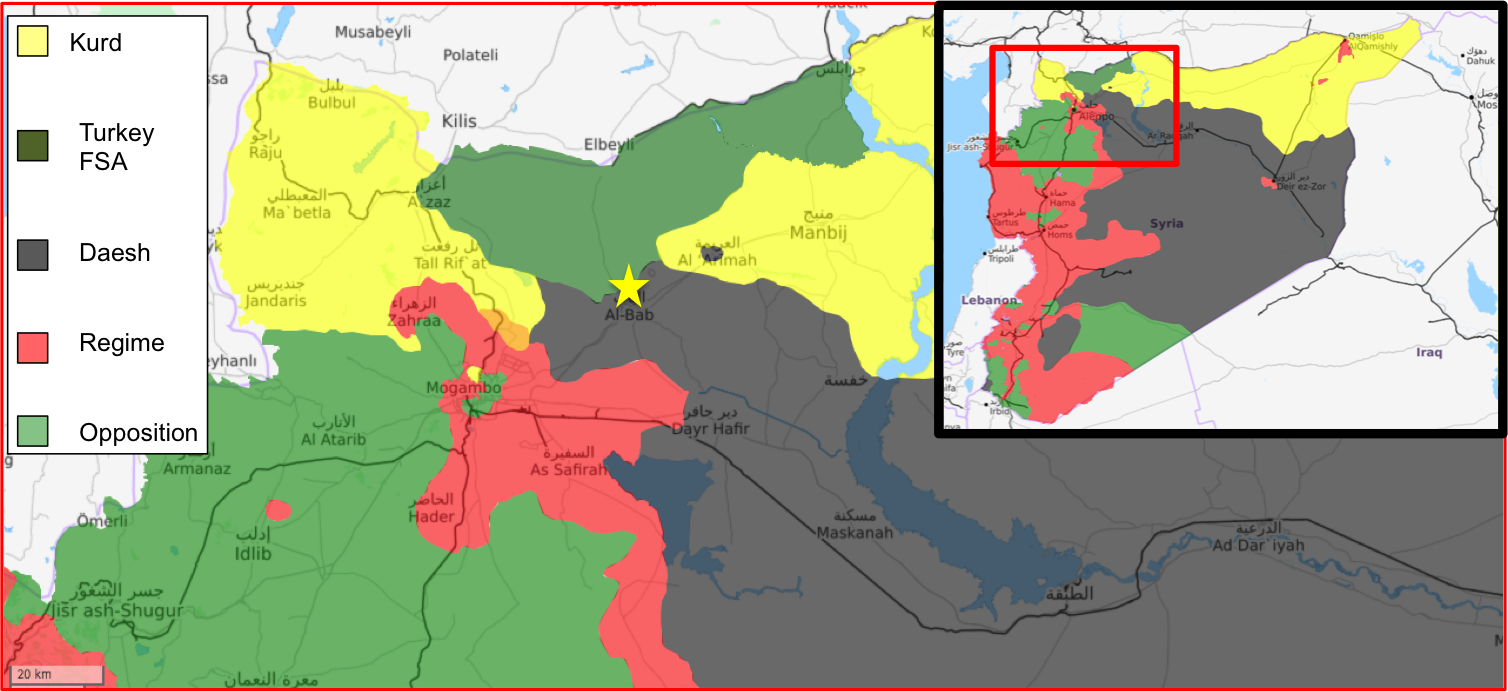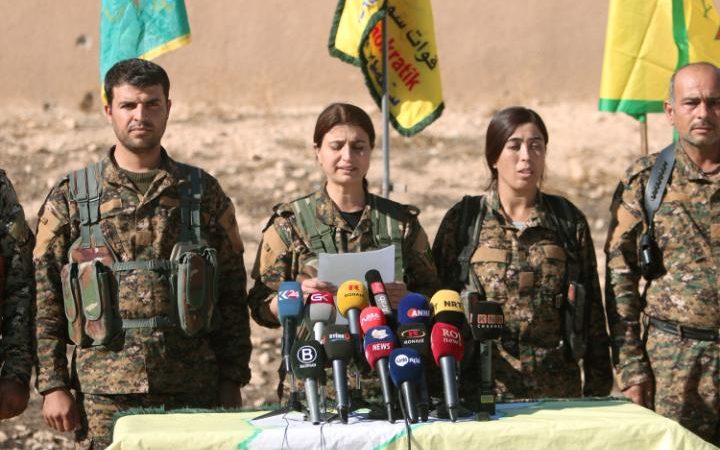A quick look at the military situation in Syria reveals – even to the most casual observer – that al-Bab is an important place. The northeastern-most outpost of the crumbling Islamic State, al-Bab – Arabic for “the Gate” – is the literal and figurative gateway to the Daesh capital, Raqqa, and the lynchpin in the ongoing strategic struggle in Syria. Located just 25 km from besieged eastern Aleppo, the small town is surrounded on three sides by enemies of Daesh. The Russian-supported Syrian regime, the US-supported, Kurdish-led Syrian Democratic Front (SDF), and the Turkish Army are all within artillery range of al-Bab and all have conflicting reasons to covet its control.
Though this seems a dire tactical situation for the defenders, mutual strategic hostility between Daesh’s enemies keeps them from acting decisively in al-Bab. The Assad Regime is at the limit of its capabilities, even with Russian support. Turkey, despite the massive superiority its Army enjoys in the region, is wary of pushing too far into Syria lest it trigger a defensive response from Assad. Lastly, the SDF, which has advanced west in a thin strip along the Turkish border from Hassakeh to beyond Manbij, believes al-Bab is perhaps a bridge too far. Seizing it could trigger a Turkish assault, possibly bringing its military into direct conflict with Russian forces for a second time since the Turkish Air Force shot down a Russian fighter in November 2015. No one, not even the Kurds, thinks this tiny town of 2.5 square kilometers is worth a world war.

America in the Middle
The United States finds itself between a rock and a hard place. In northern Syria, this means Washington has to negotiate its way through the opposing objectives of its Turkish and Kurdish allies. The ultimate Kurdish aim is to unite its northern cantons into a contiguous state they call “Rojava.” An SDF seizure of al-Bab is a big step in that direction and could favorably influence the decision in Aleppo in a way that makes Rojava more likely. For this reason, some believe Ankara is withholding support for breaking the siege of Aleppo until the SDF withdraws east of the Euphrates River.
Believing Raqqa to be the Daesh center-of-gravity, the United States pushes its Kurdish allies to seize that city instead of al-Bab. Though the SDF is the only force capable of doing so, it is not clear how they would benefit from control of the Daesh capital. The city is overwhelmingly Sunni and would not welcome Kurdish rule. More importantly, Raqqa is out of the way and an assault on it would require SDF formations to turn their backs on their archenemy, Turkey. Though cultivating American support is normally a powerful multiplier, the Kurds have overestimated Washington’s loyalty before and it is increasingly clear the United States lacks influence in northern Syria. The Pentagon has no military options that do not involve the SDF and diplomacy with both Russia and Turkey is ineffective at the moment for reasons that have nothing to do with Syria. Some suggest the Kurds want to use Raqqa as a bargaining chip for other concessions, though none of the other stakeholders are currently in a position to maintain control of the city even if they were to acquire it this way.

For its part, Turkey is vehemently opposed to the Rojava that would put Kurdish factions in control of Turkey’s entire southern border from Iran to Idlib. The only way for Turkey to stop further Kurdish advances however is with direct military intervention into neighboring states. Turkey did exactly this on August 24th 2016, when its Army seized Jarabulus on the pretext of ousting Daesh from its border. With this accomplished, the veil is now wearing thin. Turkish units and their proxies are in increasingly frequent and intensifying conflict with the SDF, placing Turkey in the uncomfortable position of fighting an American ally that happens to be the only force actually conducting offensive operations against Daesh in the upper Euphrates valley.
Worse for Turkey, there is mounting evidence its Army is seriously underperforming in the field. The highly centralized decision-making and leadership culture of the Turkish military, a serious weakness under normal circumstances, has been compounded by the ongoing purge of its officer corps. Following the abortive 15 July coup attempt, 38% of Turkey’s generals and admirals, and 8% of other ranks have been jailed or relieved. Those remaining are averse to making any recommendation that may be perceived as disloyal, even at the expense of sound military advice. Though it is unknown how much of their hesitation is self-censorship, officers down to the rank of Major continue to have their careers and livelihoods terminated without warning, even while serving in front line combat roles. This erosion of leadership results in poorly coordinated operations, slow and predictable movements, and an inability to respond effectively to frequent instances of troops in contact. The otherwise well-trained and equipped Turkish Army is losing its tactical engagements and suffering unexpectedly high casualties.
Russia and the Regime
By contrast, the Assad Regime has shown remarkable resilience throughout the terrible Syrian civil war. Though some of its longevity is due to Iranian, and later Russian support, its diplomatic efforts have yielded fruit. Despite systematic violations of human rights and the law of armed conflict, the Regime remains the internationally-recognized government of Syria. Its complex relations with a number of western powers divide the US-led Coalition on the questions of military purpose and Syria’s political future.
Russia’s intervention has also improved Assad’s military situation, though not decisively. The Syrian Army’s stranglehold on Aleppo is tenuous at best and its supply lines from Damascus to Alawite strongholds in the north remain threatened by a kaleidoscopic patchwork of hostile territory around Homs and Hama. The siege of Aleppo is completely dependent upon brutal Russian air power and Turkish restraint of its proxies in the surrounding Governorates, particularly Idlib. Meanwhile in the south and in rural Damascus, the best the Regime can hope to achieve is an economy-of-force operation that might allow it to co-opt one rebellious village at a time.
Still, Damascus – and probably Moscow – will respond vigorously to any Turkish or Kurdish moves on al-Bab. Failing to do so would dangerously weaken the already fragile encirclement of Aleppo and threaten the supply lines of Syrian forces there – the besiegers could become the besieged. Even if the Syrian Army – and the presence of Russian “advisors” – fails to deter a Turkish seizure of al-Bab, Assad still has one more card to play: he is the only one that can deliver success to the Kurds. A Syrian deal with General Masloum’s SDF, granting a contiguous and autonomous Rojava in exchange for flank security for the siege of Aleppo, is a significant deterrent threat to Turkey.
Daesh Standoff
So the game continues to swirl around al-Bab as Daesh waits patiently in the relative comfort of stalemate. With each side holding a trump card over the other, there is no sign the situation will be decided soon, though recent Kurdish moves suggest dialogue is ongoing. On 6 November, SDF spokesmen announced the commencement of the isolation of Raqqa, an operation they call “Wrath of the Euphrates”. Ten days later, in what is widely seen as a US-brokered deal to enable an SDF seizure of Raqqa without Turkish interference, the SDF announced it would withdraw east of the Euphrates, vacating the hard won districts of Qebasin (eastern al-Bab) and Manbij. There is some risk the Kurdish departure will leave a power vacuum to be filled by either the Turkish Army or by a number of competing “military councils” with varying degrees of legitimacy. However, as recently as 22 November, perhaps in recognition of these risks, the SDF was still in control of Manbij and continued to exchange fire with Turkish forces to its west.
The coming months will reveal how all these maneuvers play out. The SDF and its Coalition Special Operations advisors are not yet ready for the final assault on Raqqa. To be successful, Operation Wrath of the Euphrates will require large numbers of Arab fighters currently wary of following a Kurdish general. In this respect, recruiting for the SDF’s Arab component is dependent upon events in Mosul 530 km to the east. A quick decision there will encourage Arabs to turn on Daesh and join General Masloum. By extension, this will affect al-Bab and the siege of Aleppo. For the time being however, the question of al-Bab will remain unanswered as the Kurds march on Raqqa, leaving the Turks to either make good on promises to fight Daesh in earnest or just stay out of the way. In any case, until at least one of the players acts decisively, there will continue to be a strategic standoff at “The Gate”.
Lino Miani is a retired US Army Special Forces officer, author of The Sulu Arms Market, and CEO of Navisio Global LLC. He just completed an advisory tour with Combined Joint Task Force-Operation Inherent Resolve.

